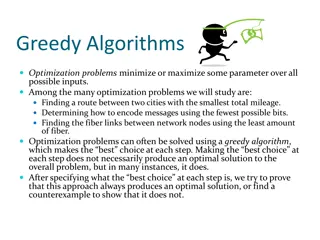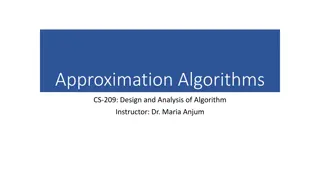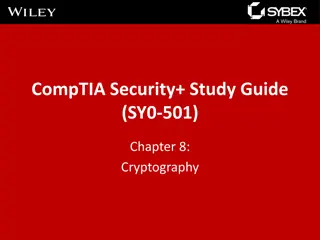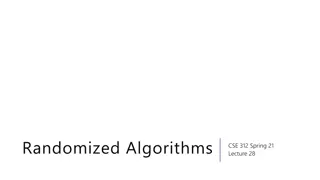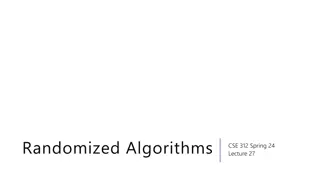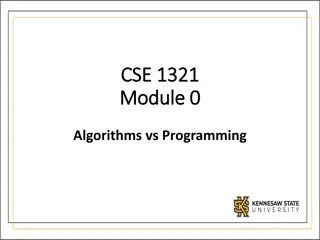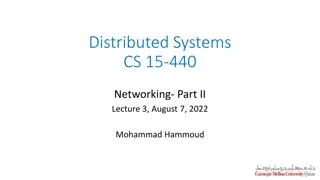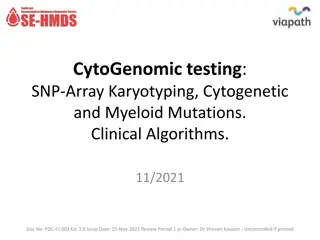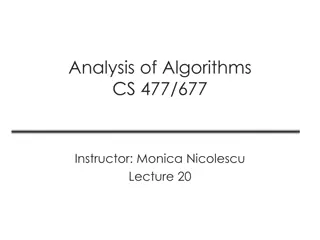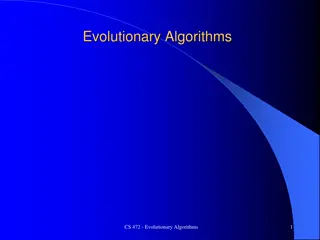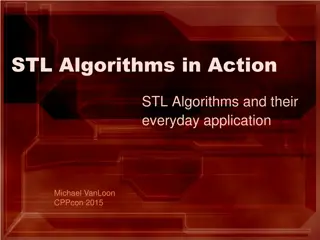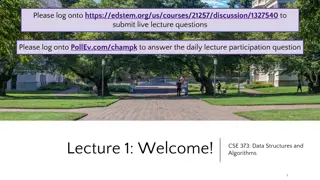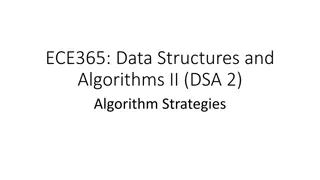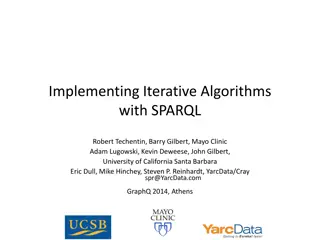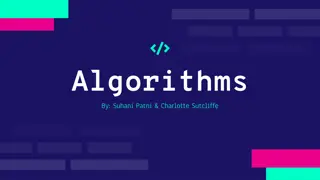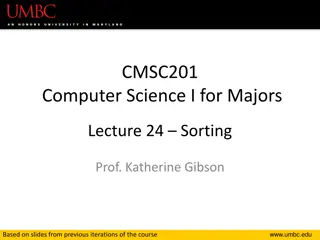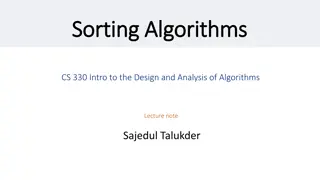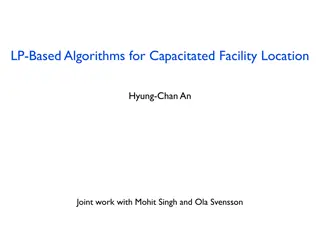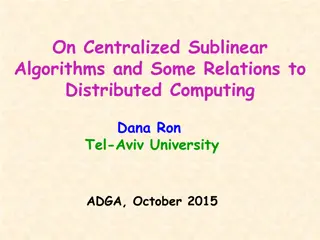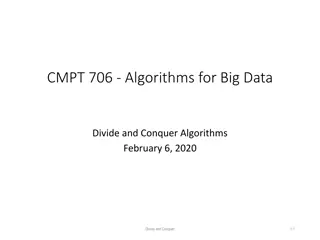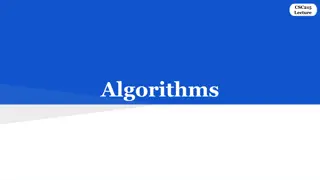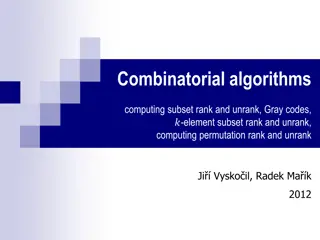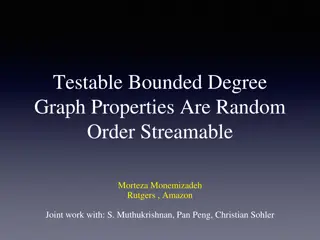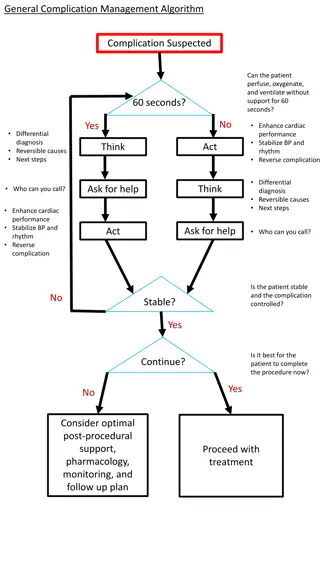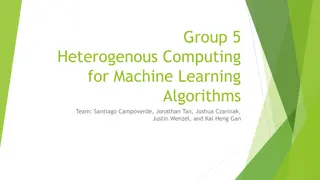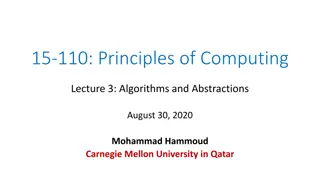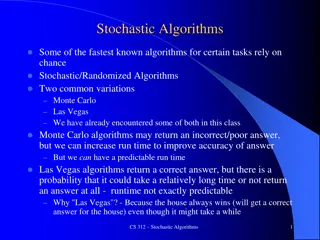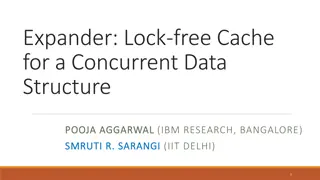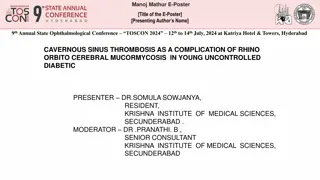Understanding Algorithms and Programming Fundamentals
Learn about algorithms, programming, and abstraction in computing. Explore the definition and properties of algorithms, the relationship between algorithms and programming, and the concept of abstraction. Discover how algorithms are like recipes and how abstraction simplifies complex tasks in comput
1 views • 17 slides
Greedy Algorithms in Optimization Problems
Greedy algorithms are efficient approaches for solving optimization problems by making the best choice at each step. This method is applied in various scenarios such as finding optimal routes, encoding messages, and minimizing resource usage. One example is the Greedy Change-Making Algorithm for mak
0 views • 12 slides
Near-Optimal Quantum Algorithms for String Problems - Summary and Insights
Near-Optimal Quantum Algorithms for String Problems by Ce Jin and Shyan Akmal presents groundbreaking research on string problem solutions using quantum algorithms. The study delves into various key topics such as Combinatorial Pattern Matching, Basic String Problems, Quantum Black-box Model, and mo
0 views • 25 slides
Understanding Approximation Algorithms: Types, Terminology, and Performance Ratios
Approximation algorithms aim to find near-optimal solutions for optimization problems, with the performance ratio indicating how close the algorithm's solution is to the optimal solution. The terminology used in approximation algorithms includes P (optimization problem), C (approximation algorithm),
2 views • 10 slides
Overview of Cryptography Techniques and Algorithms
Exploring the diverse realm of cryptography, this chapter delves into both nonmathematical and mathematical encryption methods. It covers substitution and transposition ciphers, steganography, hybrid systems, hashing, symmetric algorithms like DES and AES, as well as asymmetric algorithms utilizing
7 views • 21 slides
Combining Graph Algorithms with Data Structures and Algorithms in CSE 373 by Kasey Champion
In this lecture, Kasey Champion covers a wide range of topics including graph algorithms, data structures, coding projects, and important midterm topics for CSE 373. The lecture emphasizes understanding ADTs, data structures, asymptotic analysis, sorting algorithms, memory management, P vs. NP, heap
0 views • 38 slides
Understanding Randomized Algorithms: Types and Examples
Explore the world of randomized algorithms through types like Las Vegas and Monte Carlo, with a focus on classic examples such as Quick Sort. Learn how randomness plays a crucial role in computation and discover the principles behind these algorithms. Dive into the applications of randomized algorit
0 views • 22 slides
Understanding Randomized Algorithms: A Deep Dive into Las Vegas and Monte Carlo Algorithms
Randomized algorithms incorporate randomness into computations, with Las Vegas algorithms always providing the correct answer but varying in time, while Monte Carlo algorithms occasionally give wrong answers. Quick Sort is a classic Las Vegas algorithm that involves pivoting elements for sorting. Ch
4 views • 21 slides
Understanding Algorithms and Programming: A Visual Introduction
Explore the fundamental concepts of algorithms and programming through visual representations and practical examples. Learn about algorithmic thinking, abstraction, recipe-like algorithms, and the importance of logical steps in accomplishing tasks. Discover how algorithms encapsulate data and instru
1 views • 17 slides
Distributed Algorithms for Leader Election in Anonymous Systems
Distributed algorithms play a crucial role in leader election within anonymous systems where nodes lack unique identifiers. The content discusses the challenges and impossibility results of deterministic leader election in such systems. It explains synchronous and asynchronous distributed algorithms
2 views • 11 slides
Understanding Networking Principles and Routing Algorithms in Distributed Systems
Delve into the intricacies of networking principles and routing algorithms in distributed systems. Explore the four layers studied, including the network layer that handles routing. Discover the role of routers in forwarding packets between networks and the challenges of designing routing algorithms
1 views • 23 slides
Mathematical Analysis of Algorithms in CMPE371 - Fall 2023-2024
Explore the mathematical analysis of algorithms in CMPE371 for Fall 2023-2024, focusing on non-recursive and recursive algorithms. Learn how to analyze non-recursive algorithms by deciding on input size parameters, identifying basic operations, and simplifying summations. Dive into recursive algorit
1 views • 31 slides
Pseudodeterministic Algorithms and Their Application in Search Problems
Pseudodeterministic algorithms provide a unique approach to the search problem associated with binary relations, offering an error reduction technique while sacrificing the ability to approximate the average value of a function. By introducing m-pseudodeterministic and pseudo-pseudodeterministic alg
1 views • 6 slides
Comprehensive Algorithms for Cytogenomic Testing in Hematologic Malignancies
This document outlines clinical algorithms for the genetic evaluation of chronic lymphocytic leukemia (CLL), myelodysplastic syndromes (MDS), aplastic anemia, and idiopathic acquired aplastic anemia. It provides detailed protocols for genetic testing, including SNP array karyotyping, cytogenetic and
0 views • 8 slides
Understanding Greedy Algorithms in Algorithm Analysis
Greedy algorithms are a simpler approach compared to dynamic programming, focusing on making locally optimal choices in order to achieve a globally optimal solution. While not always yielding the best solution, greedy algorithms can provide optimal solutions for problems with specific characteristic
1 views • 23 slides
Understanding Evolutionary Algorithms in Computer Science
Evolutionary algorithms, particularly genetic algorithms, simulate natural evolution to optimize parameters and discover new solutions. By creating genomes representing potential solutions and using genetic operators like mutation and crossover, these algorithms populate a search space, conduct loca
0 views • 33 slides
Understanding STL Algorithms: A Practical Guide
Explore the world of STL algorithms through an insightful discussion on the definition of algorithms, the advantages of using STL algorithms over raw loops, and the different classes of STL algorithms available. Discover how these pre-built libraries can enhance your programming efficiency and code
1 views • 99 slides
Exploring the Role of Algorithms in Game Design
Delve into the world of algorithms in game design, from understanding the fundamental concept of algorithms to their pervasive presence in various aspects of gaming, such as military simulations, medical simulations, and gameplay mechanics. Explore how algorithms shape experiences in different types
0 views • 10 slides
CSE 373: Data Structures and Algorithms Overview
Welcome to CSE 373, a course focused on data structures and algorithms. Dive into topics like lists, stacks, queues, sorting algorithms, graphs, and more. Understand the importance of designing and analyzing data structures, preparing for technical interviews, and applying algorithms to solve comple
0 views • 27 slides
Evolutionary Computation and Genetic Algorithms Overview
Explore the world of evolutionary computation and genetic algorithms through a presentation outlining the concepts of genetic algorithms, parallel genetic algorithms, genetic programming, evolution strategies, classifier systems, and evolution programming. Delve into scenarios in the forest where gi
0 views • 51 slides
Online Advertising and Algorithms: Insights and Simplifications
Explore the world of online advertisements and algorithms through insightful discussions on online advertising, modern developments in online algorithms, and practical optimization strategies like budgeted allocation. Delve into topics such as decision-making under uncertainty, accessing algorithms,
1 views • 22 slides
Algorithm Strategies: Greedy Algorithms and the Coin-changing Problem
This topic delves into general algorithm strategies, focusing on the concept of greedy algorithms where locally optimal choices are made with the hope of finding a globally optimal solution. The discussion includes the nature of greedy algorithms, examples such as Dijkstra's algorithm and Prim's alg
0 views • 91 slides
Implementing Iterative Algorithms with SPARQL
This comprehensive guide explores the implementation of iterative algorithms with SPARQL, focusing on YarcData/Cray's approach to using these algorithms. It covers YarcData's interest in graphs, the Urika appliance, iterative algorithms in machine learning, implementation approach, and algorithms im
1 views • 12 slides
Understanding Algorithms and Sorting Methods
Algorithms are precise instructions used to solve problems efficiently, especially in computer operations. Searching algorithms like tree and graph search are essential, while sorting algorithms such as quick sort and bubble sort help organize data effectively.
0 views • 12 slides
Understanding Sorting Algorithms in Computer Science
Delve into the world of sorting algorithms in computer science with a focus on Selection Sort, Bubble Sort, Quick Sort, and Radix Sort. Learn how sorting impacts the efficiency of other algorithms and explore the scalability of different sorting methods. Discover the importance of sorting algorithms
0 views • 37 slides
Overview of Sorting Algorithms and Quadratic Sorting - CS 330 Lecture Notes
Sorting algorithms play a crucial role in computer science and computing tasks, consuming a significant portion of computing power. Various algorithms such as Bubble Sort, Selection Sort, and Insertion Sort are discussed for sorting a list of values efficiently. Quadratic sorting algorithms like Sel
0 views • 30 slides
LP-Based Algorithms for Capacitated Facility Location
This research presents LP-Based Algorithms for the Capacitated Facility Location problem, aiming to choose facilities to open and assign clients to these facilities efficiently. It discusses solving the problem using metric costs, client and facility sets, capacities, and opening costs. The research
0 views • 36 slides
Understanding Sublinear Algorithms and Graph Parameters in Centralized and Distributed Computing
Centralized sublinear algorithms and their relation to distributed computing are explored, emphasizing the efficiency of algorithms in processing large inputs in sublinear time. Examples of sublinear algorithms for various objects are provided, along with the computation and approximation of graph p
1 views • 34 slides
Understanding Divide and Conquer Algorithms for Big Data
Divide and Conquer Algorithms are a powerful paradigm in computer science where a problem is broken down into smaller parts, solved individually, and then combined to solve the original problem. This approach is exemplified in concepts like fast multiplication algorithms and finding the kth element
1 views • 27 slides
Introduction to Basic Algorithms: Searching and Sorting
Explore the fundamentals of basic algorithms focusing on searching and sorting techniques. Learn about linear (sequential) search, sorting problem complexities, and popular algorithms like Bubble Sort and Selection Sort. Discover the key concepts, terms, and functions involved in search and sort alg
0 views • 15 slides
Combinatorial Algorithms for Subset and Permutation Ranking
Combinatorial algorithms play a crucial role in computing subset and permutation rankings. These algorithms involve defining ranking functions, successor functions, lexicographic ordering on subsets, and permutation representations. The functions SUBSETLEXRANK and SUBSETLEXUNRANK are used for comput
0 views • 22 slides
Cryptographic Algorithms and Hash Collisions Overview
Explore the world of cryptographic algorithms and hash collisions. Learn about various hashing algorithms like MD5, SHA-1, SHA-256, and more. Dive into the concepts of symmetric and asymmetric key algorithms and understand the risks associated with hash collisions. Discover the implications of post-
0 views • 58 slides
Graph Property Testing and Algorithms Overview
Explore testable bounded degree graph properties, sparse graphs, d-bounded degree graphs, hyperfinite graphs, arboricity, maximum matching algorithms, and sublinear time approximation algorithms in graph data streams. Learn about various graph models and properties with examples, showcasing the impo
0 views • 53 slides
CS260 Parallel Algorithms: Theory and Practice Review
This review covers essential topics from the CS260 Parallel Algorithms course by Yihan Sun, focusing on key concepts such as scheduler programs, cost models, reduce and scan techniques, PRAM models, atomic primitives, small algorithms, the master theorem, and sorting algorithms like Quicksort and Me
0 views • 25 slides
Emergency Cardiac Complication Management Algorithms
This comprehensive guide presents a series of algorithms for managing cardiac complications efficiently and systematically. It covers a range of scenarios such as unexpected hemodynamic collapse, no-reflow situations, and dissection cases. These algorithms provide step-by-step instructions for asses
0 views • 6 slides
Enhancing Machine Learning Algorithms with Heterogeneous Computing
Team 5 is working on expanding a prior initiative by developing code to simultaneously run three different machine learning algorithms - Preprocessing, Blink Detection, and Eye Tracking. Their project involves implementing these algorithms on a Xilinx Kria evaluation board using process and memory i
0 views • 6 slides
Simplifying Algorithms with Variables and Indices
When writing algorithms, simplifying sequences of steps using variables and indices can lead to clearer and more concise explanations. By defining variables for elements and using indices to denote sequences, algorithms become easier to understand and manage. This approach helps in streamlining the
0 views • 22 slides
Exploring Stochastic Algorithms: Monte Carlo and Las Vegas Variations
Stochastic algorithms, including Monte Carlo and Las Vegas variations, leverage randomness to tackle complex tasks efficiently. While Monte Carlo algorithms prioritize speed with some margin of error, Las Vegas algorithms guarantee accuracy but with variable runtime. They play a vital role in primal
0 views • 13 slides
Understanding Lock-Free and Wait-Free Algorithms in Concurrent Data Structures
Illustration of lock-free and wait-free algorithms compared to blocking algorithms, with insights on concurrent object execution, blocking vs. non-blocking algorithms, definitions, comparisons between locks, lock-free, and wait-free approaches, and explanations on making algorithms wait-free. Exampl
0 views • 23 slides
Cavernous Sinus Thrombosis Complication in Young Diabetic - Case Study from TOSCON 2024
Cavernous sinus thrombosis is a severe complication of rhino-orbito-cerebral mucormycosis in a young uncontrolled diabetic patient presented at the 9th Annual State Ophthalmological Conference (TOSCON) 2024. The case involves a 30-year-old male with diabetes, experiencing headache, fever, and rapid
0 views • 6 slides

